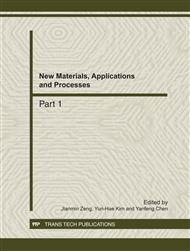p.268
p.273
p.279
p.284
p.289
p.294
p.300
p.305
p.310
Optimisation of Manufacturing Conditions of Carbon Fibre Reinforced Polyetherketoneketone (PEKK) Composite
Abstract:
The effects of different processing conditions (pressure, holding time and temperature) on the impregnation/consolidation quality of CF/PEKK composite were investigated using compression molding process. Microscopic investigation of cross-sections, density measurements and flexural mechanical properties were used to examine the quality of impregnation and consolidation. A qualitative model to describe the impregnation and consolidation process of this material was developed. The model predicts the variations of void content during consolidation as well as the holding time, moulding temperature and pressure required to reach full consolidation. Good agreement between theoretical predictions and experimental data was achieved. Optimum processing conditions can be determined based on selected void content.
Info:
Periodical:
Pages:
289-293
Citation:
Online since:
November 2011
Authors:
Keywords:
Price:
Сopyright:
© 2012 Trans Tech Publications Ltd. All Rights Reserved
Share:
Citation:


